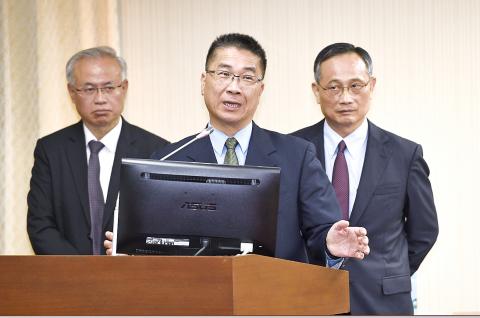The US supports Taiwan’s meaningful participation in international organizations, including Interpol, a US Department of State spokesperson said on Tuesday.
The spokesperson made the statement after Taipei said that it was asking friendly nations to speak up at an Interpol executive committee meeting to support Taiwan’s participation at Interpol’s general assembly that opens on Nov. 16 in Dubai, United Arab Emirates.
The spokesperson said Washington supports Taiwan’s participation in international organizations whether or not they require statehood.

Photo: George Tsorng, Taipei Times
“In organizations that require statehood for membership, the US supports Taiwan’s meaningful participation. This includes the ICAO [International Civil Aviation Organization], Interpol, WHO and the more than 60 international organizations in which Taiwan participates,” the spokesperson said.
The Criminal Investigation Bureau (CIB) on Monday said that it sent a letter to ask that it participate as an observer at the Interpol assembly.
Ministry of Foreign Affairs Department of International Organizations Director-General Bob Chen (陳龍錦) on Tuesday said that Interpol had received the letter sent by CIB Commissioner Tsai Tsan-po (蔡蒼柏) last month, but has yet to respond.
Minister of the Interior Hsu Kuo-yung (徐國勇) yesterday told lawmakers that Taiwan’s participation in the assembly would be beneficial for China.
Asked by Democratic Progressive Party (DPP) Legislator Liu Shih-fang (劉世芳) whether former Interpol president and Chinese Deputy Minister of Public Security Meng Hongwei (孟宏偉) being under investigation would give Taiwan a better chance of attending the assembly, Hsu, who was appearing at the Legislative Yuan to report on the government’s drug policy, said the government is trying very hard to make that happen.
The Department of State’s expression of support for Taiwan’s participation was a strong boost for the nation’s effort to attend the assembly, he said.
Asked by People First Party Legislator Chen Yi-chieh (陳怡潔) whether the government has received a response from Interpol, Hsu said it has not.
China’s obstruction is the only thing preventing Taiwan from taking part in the assembly, he said, adding that it has a great effect on global efforts to fight crime, such as the smuggling of illegal drugs.
Blocking Taiwan from participating in the assembly does not benefit the investigation of cross-border crimes in any way, he said.
More than 70 percent of illegal drugs circulating in Taiwan originate in China, he said.
He urged Beijing to allow Taiwan to join Interpol, adding that doing so would be helpful for maintaining peace around the world.
Asked by Liu whether a mechanism is in place for cross-strait cooperation against crime, National Police Agency Director-General Chen Ja-chin (陳家欽) said that while the two sides are still cooperating on individual cases, these instances have become fewer.
The cases on which Taiwan and China are working more closely are fraud cases, which affect the property and safety of Taiwanese and Chinese, he said.
The two sides have also been working together in the fight against illegal drugs, he added.

TRAGEDY STRIKES TAIPEI: The suspect died after falling off a building after he threw smoke grenades into Taipei Main Station and went on a killing spree in Zhongshan A 27-year-old suspect allegedly threw smoke grenades in Taipei Main Station and then proceeded to Zhongshan MRT Station in a random killing spree that resulted in the death of the suspect and two other civilians, and seven injured, including one in critical condition, as of press time last night. The suspect, identified as a man surnamed Chang Wen (張文), allegedly began the attack at Taipei Main Station, the Taipei Fire Department said, adding that it received a report at 5:24pm that smoke grenades had been thrown in the station. One man in his 50s was rushed to hospital after a cardiac arrest

A car bomb killed a senior Russian general in southern Moscow yesterday morning, the latest high-profile army figure to be blown up in a blast that came just hours after Russian and Ukrainian delegates held separate talks in Miami on a plan to end the war. Kyiv has not commented on the incident, but Russian investigators said they were probing whether the blast was “linked” to “Ukrainian special forces.” The attack was similar to other assassinations of generals and pro-war figures that have either been claimed, or are widely believed to have been orchestrated, by Ukraine. Russian Lieutenant General Fanil Sarvarov, 56, head

SAFETY FIRST: Double the number of police were deployed at the Taipei Marathon, while other cities released plans to bolster public event safety Authorities across Taiwan have stepped up security measures ahead of Christmas and New Year events, following a knife and smoke bomb attack in Taipei on Friday that left four people dead and 11 injured. In a bid to prevent potential copycat incidents, police deployments have been expanded for large gatherings, transport hubs, and other crowded public spaces, according to official statements from police and city authorities. Taipei Mayor Chiang Wan-an (蔣萬安) said the city has “comprehensively raised security readiness” in crowded areas, increased police deployments with armed officers, and intensified patrols during weekends and nighttime hours. For large-scale events, security checkpoints and explosives

PUBLIC SAFETY: The premier said that security would be tightened in transport hubs, while President Lai commended the public for their bravery The government is to deploy more police, including rapid response units, in crowded public areas to ensure a swift response to any threats, President William Lai (賴清德) said yesterday after a knife attack killed three people and injured 11 in Taipei the previous day. Lai made the remarks following a briefing by the National Police Agency on the progress of the investigation, saying that the attack underscored the importance of cooperation in public security between the central and local governments. The attack unfolded in the early evening on Friday around Taipei Main Station’s M7 exit and later near the Taipei MRT’s Zhongshan